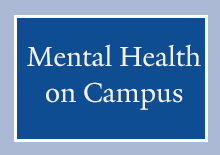Mental Health Statement

To: The Yale Community -
Several months ago, incoming President Peter Salovey asked students for their perspectives on a number of issues that affect campus life. He identified mental health as a high priority. In response, the Yale College Council (YCC) and the Graduate Student Assembly (GSA) in conjunction with the Graduate and Professional Student Senate (GPSS) produced insightful reports that have started an important conversation about student well being. (See the reports here and here.)
To understand the culture surrounding mental health at Yale, the YCC Task Force on Mental Health interviewed many students, faculty and administrators in mental health-related roles; assessed Yale culture and resources; and made recommendations for action. The GSA and GPSS Joint Ad Hoc Committee on Mental Health provided an overview of the current situation, a review of resources at peer institutions, and recommendations for improvements. Information from both reports is extremely helpful as we examine how best to enhance mental health and counseling for all members of our community.
Yale attracts “the best and the brightest,” achievers who are driven by internal and external pressure to reach for new heights of success. In this way, Yale is much like its peers. Living and working in this type of environment, it is normal for students to feel anxious about academic and social pressures. However, the culture at Yale seems to discourage acknowledging vulnerability; rather, many students feel additional pressure to be “effortlessly excellent,” as one student so aptly put it. This expectation is not realistic and not healthy.
Since the YCC and GSA/GPSS reports were issued, discussions and collaborative efforts have been underway at all levels. Students, freshmen counselors, peer liaisons, medical staff, and administrators are all engaged and committed to improving student mental health. We are especially encouraged that undergraduate students have already held a student forum to discuss how they can work together to improve aspects of campus culture and well-being, which we believe is an indication of how important the issue of mental health is. Individuals and groups, including the Council of Masters, Yale Health’s Mental Health & Counseling Department (MH&C), members of the Yale College Dean’s Office, and the Provost’s Office have been reviewing the findings and are considering next steps. MH&C continues to collaborate with students to consider what direction future programs may take.
Although many helpful resources exist for students dealing with mental health issues, we believe that awareness about and access to those resources needs improvement. Where possible, we are taking immediate action. For more complex issues, we are considering the best alternatives to foster a healthy environment for students, faculty, and staff. Key plans include reviewing and updating the MH&C website to make information about MH&C processes more accessible, in addition to producing videos on how to access Yale MH&C.
As a university community, we are committed to providing the type of environment in which everyone thrives. We look forward to continuing the dialog and implementing changes that make mental health care less stigmatized and more accessible to all.
Mary Miller, Dean of Yale College
Kimberly Goff-Crews, Secretary and Vice President for Student Life
Lorraine Siggins, Chief Psychiatrist at Yale Health
Daniel Avraham, President of the Yale College Council
Brian Dunican, Chair of the Graduate Student Assembly
Steven Reilly, President of the Graduate and Professional Student Senate